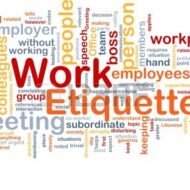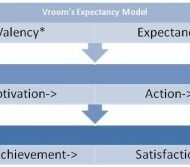Posted by Managementguru in Human Resource, Motivation, Organisational behaviour, Principles of Management, Training & Development
on Mar 18th, 2014 | 0 comments

Promoting Effective Communication in the Work Place A purpose or an idea to be conveyed is needed for communication to happen. The question is how well or how successful you are in transmitting the message (mind you! without transforming it) to the receiver in the proposed meaning, whatever the channel might be! Communication must serve the following functions… Effective Control Motivational expression Information Fundamentally communication helps in controlling the behavior of the members of an organization in several ways. Either formal or informal, it controls the activities of the employees by prescribing certain procedures of communication to be followed when there is a grievance or a difficulty regarding his/her job, the work situation etc. Communication provides Vital Information: Communication also motivates people by clarifying what needs to be done, how to be done and how they are performing and what can be done to improve their performance. Most important function is that communication provides vital information that is crucial for members at all spans or levels to make effective decisions. The feelings of members are also articulated as grapevine in an organization, and in a way it serves as an outlet for their emotional expression. Grapevines: Grapevines are always not harmful, they might even give you information about the pulse of people working for you and if you are really sharp, “you can work it out to your advantage. Communication is always referred to as “oxygen”, we can feel only when it breaks down. Communication plays an important role in managerial and organizational effectiveness. Nevertheless, on the other side it can be the root cause of all the problems in your organization. This excellent infographic on Business Etiquette and Body Language Blunders clearly indicates how body language and gestures influence communication to a greater level. Source: www.thewebsitegroup.uk Effective Communication: In general, effective communication is the prerequisite for any healthy organization and the attainment of its standard objectives. Most of us are in fact aware of how our vocabulary has been modified to reflect political correctness. For instance we have replaced certain words like handicapped, blind and elderly by physically challenged, visually impaired and senior. One must be sensitive to others feelings. Words are the primary means by which people communicate; so due importance must be given for politically correct words both in the society at a larger level and in firms at the micro level. Increasingly, I find people like being addressed by their designation capacities. Even people might get offended if you call them by their first names as it is regarded to be disrespectful. But I think it is always better to address a person giving due respect to his position if you are reporting to him. That way there is no scope for conflicts and strained relationships. Western countries are more modern in their outlook and have a broader perspective on human interactions than the east. Gestures: Words mean different things to different people. In organizations, people of different background work together, so they have their own language of expressing their opinions and ideas. So it calls for a uniformity of language that is well understood and appreciated by all. Gestures also play their part in communicating ideas. So self controlled expressions, proper behavior are also necessary that completes a communication process. Ultimately proper communication leads to… Satisfied employees Effective feedback Organisational efficiency Freedom for suggesting ideas Enhanced interpersonal relationships Closely knit organisational network Encouraging trust and openness. Communication is an on-going process and the purpose is “not to dictate but to make the employees understand the big picture” as to how the process imparts success and viability to the...

Posted by Managementguru in Business Management, Human Resource, Motivation, Organisational behaviour, Principles of Management
on Mar 10th, 2014 | 0 comments

Employee Morale – Role and Effect What is Morale? Morale is a word that conveys different meaning to different people. It might imply the following meanings: 1. Mental Attitude or Mind set from a psychologist’s perspective 2. A feeling of togetherness from an individual’s point of view 3. Group consent in terms of a business environment etc. Morale can be defined as ” an attitude of mind which conditions how well or how badly duties are performed”- W.H.Walley It can also be defined as ” the collective attitudes of workers towards one another, the employer, the management, or their work”-J.C.Denyen Morale is ” the capacity of group of people to pull together persistently and consistently in pursuit of a common purpose”-Dr.Deighton Morale is thus the undercurrent in an organisation that determines the performance levels of the employees as it dictates employees’ enthusiasm, voluntary conformance with regulations and orders and willingness to co-operate with fellow workers to accomplish the enterprise objectives. Poor morale is evident from in-subordination, discouragement and dislike of job, company and associates. Nature of Morale What it is? : Emotional by nature , a state of well- being and an attitude of mind. What it does? : Directly related to quality of work, enthusiasm, motivation, productivity, discipline, co-operation and initiative. Where it resides? : In the minds, attitudes and emotions of employees as individuals and as groups. Whom it affects? : Employees and executives during their interaction and ultimately the customers and the community. What it affects?: Willingness to work and placing the enterprise objective behind self interest. To summarise, the ill effects of Bad Morale would be Reduced productivityIncreased absenteeismAntagonism towards managementToo much of complaints and grievancesIncreased employee turn-overFriction between employeesAlcoholismAccidentsIncreased lethargy In contrary High Morale leads to Willing co-operation towards enterprise objectivesLoyalty to the managementGood behaviour in conformance with the rules and regulationsStrong and coherent groups leading to organisational staminaPrioritising jobs and placing self interest behind organisational objectivesIncreased sense of participationPride in organisation Picture Courtesy: extramadness.com Ways to Improve Employee Morale From the workers’ point of view: Fair compensation and bonusSatisfactory working conditions conforming to safety and securityTreated with dignityEfficient and amiable leadershipScope for expressing their views for improvementAcceptable working hoursEnsuring economic security From the management’s view point Co-operation from the employeesStability of tenureIncreased productivityLow cost per unitLoyalty of the workers Is it possible to measure Employee Morale? Level of productivity: When the morale is low due to different reasons, higher is the chance of absenteeism, accidents and grievances since the employees try to overlook their responsibilities towards the organisation. Therefore it is the responsibility of the management to settle and score issues relating to employees or unions then and there to avoid those issues blowing out of proportion. Morale Surveys These are generally conducted by individual organisations to find out if the employees are satisfied with their job and task and how they feel about it. This is considered to be a fairly important measure to gauge the kind of relationship the employees have with the management. Surveys also indicate whether the channel of communication is open between the superiors and sub-ordinates and serves as an emotional release for the workers to express their real feelings. Types of Morale Surveys: Objective Surveys: Objective type of questions are given to the employees for answering but the flaw is that, the management representative writes the answers and this does not give a chance for the workers to express their feelings. Descriptive Surveys: Here the employees write their answers to queries asked which are more descriptive in nature and reflects the actual feelings of each individual. Projective Surveys: Sometimes psychological tests are conducted to bring out the hidden feelings from tight lipped employees or who fear the management. The management must be aware of the following morale...

Posted by Managementguru in Business Management, Motivation, Organisational behaviour, Principles of Management
on Mar 10th, 2014 | 0 comments

Motivation is one area where periodical updates are necessary for an organisation to gauge the morale and mood of their employees. Companies sometimes act very smart in that they break their hands by patting their own back. If you wish to propel your organisation forward, you need to satisfy your work force first. The million dollar question is a big “HOW?” Well, a problem properly diagnosed is half done. And this motivation thingy is not a problem at all. Keen observation and understanding is what is needed on a manager’s part to steer things in the right direction, that is good for the company. Man, even your kid will turn his back if you want to take control by unleashing your power. The right thing to do is to find out exactly how motivated they are. There are several things that come into the purview of motivation.Let us do this in a questionnaire format so that things might fall in place. Question No 1: What is that, that motivates an employee, to be more precise your employee? (This turns out to be the hot dissertation topic for many young MBA’s) Is it any one of the following? Financial rewards Clear Goals Connecting with others Rank Appreciation and Recognition Throat neck competition Job security Fear Results Excitement Variation or Diversity Principle of Motivation: Well, the principle of motivation is pretty much the same for all individuals. I 100 % go with Maslow’s hierarchial needs theory which travels right from physical needs at the base of the pyramid upto self realisation at the top. If this is the case,how come there is a disparity when everybody is subjected to the same kind of influence at the work place? For some it stops somewhere in the middle who are very much satisfied with the pay check figure and the perks that go with it. For some there is an inner drive that makes them unstoppable until they reach the pinnacle. This is the very thing that differentiates a manager from a subordinate. This is the very thing that distinguishes a CEO from a manager. This is the same thing that generates top business guns and management gurus who fall a genre apart form the rest of the crowd. Well, there are other factors such as the family background and the environmental influence that shaped up your personality all through. Motivation Surveys: Motivation surveys are not only important in getting to know your employees but also it showers a immaculate image on the company. It feels good for your workforce when they are involved and consulted with, on issues related to themselves. A recent Harvard review has stated that most of the managers feel that they really get motivated when there is : “Recognition for Good Work.” But folks, you will be surprised to know that the same review reveals another side of the coin, the top motivation for workers is when they make “Progress.” Again, call it the inner drive, impulse, motive, ambition, fire in belly, vigor, vitality…Getting to know your work force makes you “BOND WITH THEM” and it aids you in plugging the holes at the right place and at the right time. See, there is no bench mark for motivation, you respect your work force, treat them with dignity, communicate well and give them what they want and that’s it, you are defintely a winner. If you are a person capable of motivating your work force, you automatically become a source of inspiration. My humble suggestions to managers goes thus: 1. Make your employees understand what motivates them.( Kindly find what flares your temper before venturing into this exercise.!) 2....

Posted by Managementguru in Business Management, Motivation, Organisational behaviour, Principles of Management
on Mar 9th, 2014 | 0 comments

How well employees know about your Organization? Now, this is a million dollar question and a prominent issue that has to be taken care of when it comes to motivating your employees. Transparency is a booster pack that works out wonders in the area of motivation. 25 Great Motivational Quotes to Kickstart Your Life How can a management be transparent in key areas like finance and business deals, my question is WHY NOT? The success of operations of a firm relies solely upon the performance of individuals who work towards the accomplishment of goals. They are the key persons who should be kept abreast about the activities of the firm. What makes some organizations stand out? When the Boss wants each and every employee to be truthful and loyal to him, the same expectancy would be there on the part of the workforce –Why don’t the bosses understand this? Integrated Organizational Development I would cite TVS Group as a classic example that commands respect from the employees and many a times I’ve heard people say that they are proud to work for TVS. What makes the employees so motivated to work for certain firms overlooking the pay scale and perks? One should deeply delve into the psychological theories that support motivation, perception and attitude. Etiquette of the company: This is one thing that a firm has to clearly communicate to its work force. The ideology and principle behind the running of the business should be genuine and authentic. The pathway to achieve those missions should be realistic and achievable-to put it clearly a firm should have its business roots stemming out from clear cut intent and purpose. When JRD Tata wanted to start a steel plant in India, not many believed it to be a possible venture. The business legend had clear cut intent of installing a steel plant to utilize the resources available in India and to pass on the proceeds for the economic benefit of the country. Nobody suspected his intent; such was his determination and resolve. This infographic beautifully portraits the scenario of how the future employees would be: Communication of Goals: The management will have clear plans of production target which has to be communicated properly to the lowest level with the same amount of clarity. This has to be done via channels or different levels of management and executives have to play their roles properly. Nobody needs to show their prowess or power; only thing needed is proper delegation of authority and responsibility. This gives clear direction to the work force and when their immediate boss sits with them for periodic discussions to decide on the short term as well as long term objectives, they feel part of the show which immensely motivates them. Ethical Standards of the company: This again adds image to the company and “As is the Leader so is the Employee.” The management should not involve itself in any kind of lobbying – When there is political corruption, malpractices become the order of the day. What Kind of a Leader Are You? A country like India needs more educated leaders who can bring awareness on the importance of economic independence and even distribution of wealth to the masses. If people clearly know what is right and what is wrong, the unwanted elements cannot take them for a ride. Given the population, India though marching towards becoming a developed nation, the growth is hindered by poor policy decisions and sky rocketing inflation. Clarity in Structure: Ego clashes start when the organizations have more number of levels and generate chaos in communication. Misunderstanding creeps in because there...

Posted by Managementguru in Business Management, Motivation, Organisational behaviour, Principles of Management
on Mar 9th, 2014 | 0 comments

Herzberg and Victor’s Motivation Models Herzberg’s Hygiene Factor Theory Psychologist Fredrick Herzberg asked a basic question to 200 accountants and engineers in firms in and around Pittsburg-“What do people want from their jobs’? He used the critical incident method of obtaining data for analysis. “Think of a time when you felt exceptionally good or exceptionally bad about your job, either your present job or any other job you have had”. The responses obtained were fairly consistent in that, good feelings were associated with job content and bad feelings with job context. The ones on the right side of the table are intrinsic factors leading to job satisfaction and acted as motivators and ones on the left side lead to job dis-satisfaction and were termed as hygiene factors. Hygiene Factors: One has to understand that hygiene factors need not always cause dis-satisfaction; when the managers handle the situation in an amicable manner in terms of company policy, supervision, working conditions, salary and administration, things will be in the right direction but, even if they are adequate, people are never satisfied. These are called Hygiene factors and managers must try to eliminate factors that create discontent among the workers. If we want to motivate people, the real motivators are achievement, recognition, responsibility and growth. We must change the job design in such a way that the work arising out of the job should be challenging, exciting and should offer them a sense of achievement, recognition and growth. HYGIENE FACTORS MOTIVATORS Company policy Achievement Relationship with superiors Recognition Working conditions Work itself Salary Responsibility Relationship with peers Advancement Personal life Growth Relationship with subordinates Status Security CRITICISM: The factors which one particular group of individuals finds to be dis-satisfying may not be applicable for everybody. Factors which are beyond the scope of employees such as policy formulations cannot be considered as hygiene factors. VICTOR H. VROOM’S EXPECTANCY MODEL Valency*Expectancy=Motivation By increasing the positive value of the outcomes through such means as better communication about the outcomes, values and actually increasing them, i.e., the rewards and also by increasing the expectancy of the person by making him believe that the work will really lead him to the desired outcome, organizations can make a strong connection between the work and the...










